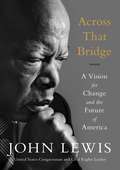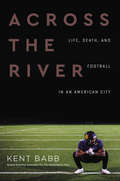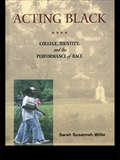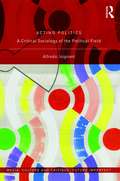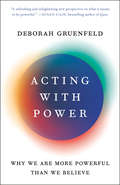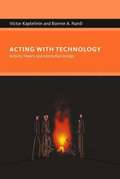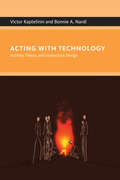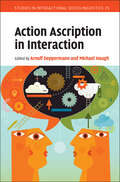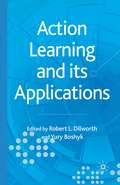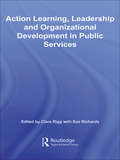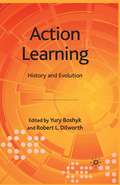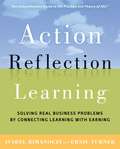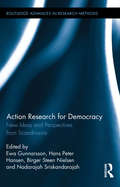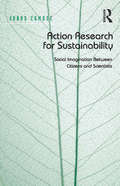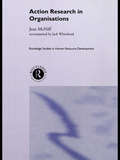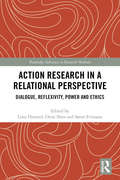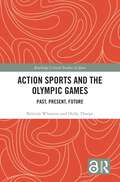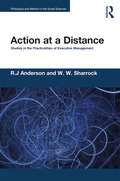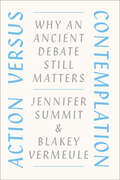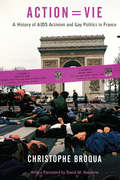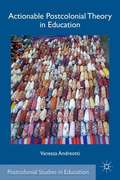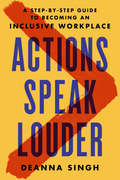- Table View
- List View
Across That Bridge: Life Lessons and a Vision for Change
by John LewisWinner of the NAACP Image Award for Outstanding Literary Work/Biography -- in paperback for the first time.In turbulent times Americans look to the Civil Rights Movement as the apotheosis of political expression. As we confront questions of social inequality there's no better time to revisit the lessons of the '60s and no better leader to learn from than Congressman John Lewis.In Across That Bridge, Congressman Lewis draws from his experience as a leader of the Civil Rights Movement to offer timeless guidance to anyone seeking to live virtuously and transform the world. His wisdom, poignant recollections, and powerful ideas will inspire a new generation to usher in a freer, more peaceful society. The Civil Rights Movement gave rise to the protest culture we know today, and the experiences of leaders like Congressman Lewis have never been more relevant. Now featuring an updated introduction from the author addressing the current administration, Across that Bridge offers a strong and moral voice to guide our nation through an era of great uncertainty."The most important lesson I have learned in the fifty years I have spent working toward the building of a better world is that the true work of social transformation starts within. It begins inside your own heart and mind, because the battleground of human transformation is really, more than any other thing, the struggle within the human consciousness to believe and accept what is true. Thus to truly revolutionize our society, we must first revolutionize ourselves. We must be the change we seek if we are to effectively demand transformation from others." ---John Lewis in Across That Bridge
Across the River: Life, Death, and Football in an American City
by Kent BabbA “gripping” account of a New Orleans high school football team fighting to win on the field—and survive on the streets (Lars Anderson, New York Times–bestselling author of A Season in the Sun).On the west bank of the Mississippi lies the New Orleans neighborhood of Algiers. Short on hope but big on dreams, its mostly poor and marginalized residents find joy on Friday nights when the Cougars of Edna Karr High School take the field. For years, this football program has brought glory to Algiers, winning three consecutive state championships and sending dozens of young men to college on football scholarships.Although he is preparing for a fourth title, head coach Brice Brown is focused on something else: keeping his players alive. An epidemic of gun violence plagues New Orleans and its surrounding communities and has claimed many innocent lives, including Brown’s former star quarterback, Tollette “Tonka” George, shot near a local gas station.Award-winning sports journalist Kent Babb follows the Cougars through the 2019 season as Brown and his team—perhaps the scrappiest and most rebellious group in the program’s history—vie to again succeed on and off the field. Sure to become a classic of sports journalism, Across the River is a necessary investigation into the serious realities of young athletes in struggling neighborhoods: gentrification, eviction, mental health issues, the drug trade, and gun violence. It offers a rich, unflinching portrait of a coach, his players, and the West Bank, a community where it’s difficult—but not impossible—to rise above the chaos, discover purpose, and find a way out.“A penetrating, wide-screen story of what it means to mentor under the toughest of circumstances.” —Kirkus Reviews (starred review)“Masterful . . . equal parts heartbreaking and life-affirming.” —Jeff Pearlman, New York Times–bestselling author of Three-Ring Circus“A moving and evocative portrait of football and life.” —Publishers Weekly
Acting Black: College, Identity and the Performance of Race
by Sarah Susannah WillieSarah Willie asks: What's it like to be black on campus. For most Black students, attending predominantly white universities, it is a struggle. Do you try to blend in? Do you take a stand? Do you end up acting as the token representative for your whole race? And what about those students who attend predominantly black universities? How do their experiences differ?In Acting Black, Sarah Willie interviews 55 African American alumnae of two universities, comparable except that one is predominantly white, Northwestern, and one is predominantly black, Howard. What she discovers through their stories, mirrored in her own college experience , is that the college campus is in some cases the stage for an even more intense version of the racial issues played out beyond its walls. The interviewees talk about "acting white" in some situations and "acting black" in others. They treat race as many different things, including a set of behaviours that they can choose to act out.In Acting Black, Willie situates the personal stories of her own experience and those of her interviewees within a timeline of black education in America and a review of university policy, with suggestions for improvement for both black and white universities seeking to make their campuses truly multicultural. In the tradition of The Agony of Education (Routledge, 1996) , Willie captures the painful dilemmas and ugly realities African Americans must face on campus.
Acting Politics: A Critical Sociology of the Political Field (Media, Culture and Critique: Future Imperfect)
by Alfredo JoignantFollowing Bourdieu, this book seeks ‘to think about politics without thinking politically’, advancing the view that politics as conventionally understood does not take place in a social vacuum, but in the context of a certain topography of society that cannot be reduced to formal spaces (such as a parliament). Engaging with Bourdieu’s theory of fields and focusing specifically on the notion of the ‘political field’, the author analyses from a sociological perspective the functioning of the political field, seeing it not simply as a formal space, but as encompassing a sphere that is increasingly autonomous from others and driven by reasons and motives beyond those conventionally recognised as political. Illustrated with cases from the real political life of different countries, Acting Politics examines the nature of the practices of the agents who inhabit the political field, building a picture of a type of competitive political activity that is fundamentally social and symbolic. A sociological reading of the agents, struggles and forms of the contemporary political field, this book thinks with and against Bourdieu in a broad dialogue with different sociological currents and debates in other disciplines. As such, it will appeal to scholars of politics and sociology with interests in social and political theory and political sociology.
Acting with Power: Why We Are More Powerful Than We Believe
by Deborah GruenfeldThere is so much we get wrong about power. This eye-opening look at the true nature of power explores who has it, what it looks like, and the role it plays in our lives.&“A refreshing and enlightening new perspective on what it means to be powerful.&”—Susan Cain, bestselling author of QuietGrounded in over two decades&’ worth of scientific research and inspired by the popular class of the same name at Stanford&’s Graduate School of Business, Acting with Power offers a new and eye-opening paradigm that overturns everything we thought we knew about the nature of power. Although we all feel powerless sometimes, we have more power than we tend to believe. That&’s because power exists in every relationship, by virtue of the roles we play in others&’ lives. But it isn&’t a function of status or hierarchy. Rather, it&’s about how much we are needed, and the degree to which we fulfill our responsibilities. Power isn&’t a tool for self-enhancement or a resource for personal consumption. It&’s a part you play in someone else&’s story. We often assume that power flows to those with the loudest voice or the most commanding presence in the room. But, in fact, true power is often much quieter and more deferential than we realize. Moreover, it&’s not just how much power we have but how we use it that determines how powerful we actually are. Actors aren&’t the only ones who play roles for a living. Like actors, we all make choices about how to use the power that comes with our given circumstances. We aren&’t always cast in the roles we desire—or the ones we feel prepared to play. Some of us struggle to step up and be taken more seriously, while others have trouble standing back and ceding the spotlight. Some of us are used to hearing we are too aggressive, while others are constantly being told we are too nice. Deborah Gruenfeld shows how we can all get more comfortable with power by adopting an actor&’s mindset. We all know what it looks like to use power badly. This book is about how to use power well.
Acting with Technology: Activity Theory and Interaction Design
by Victor Kaptelinin Bonnie A. NardiActivity theory holds that the human mind is the product of our interaction with people and artifacts in the context of everyday activity. Acting with Technology makes the case for activity theory as a basis for understanding our relationship with technology. Victor Kaptelinin and Bonnie Nardi describe activity theory's principles, history, relationship to other theoretical approaches, and application to the analysis and design of technologies. The book provides the first systematic entry-level introduction to the major principles of activity theory. It describes the accumulating body of work in interaction design informed by activity theory, drawing on work from an international community of scholars and designers. Kaptelinin and Nardi examine the notion of the object of activity, describe its use in an empirical study, and discuss key debates in the development of activity theory. Finally, they outline current and future issues in activity theory, providing a comparative analysis of the theory and its leading theoretical competitors within interaction design: distributed cognition, actor-network theory, and phenomenologically inspired approaches.
Acting with Technology: Activity Theory and Interaction Design (Acting with Technology)
by Victor Kaptelinin Bonnie A. NardiA systematic presentation of activity theory, its application to interaction design, and an argument for the development of activity theory as a basis for understanding how people interact with technology.Activity theory holds that the human mind is the product of our interaction with people and artifacts in the context of everyday activity. Acting with Technology makes the case for activity theory as a basis for understanding our relationship with technology. Victor Kaptelinin and Bonnie Nardi describe activity theory's principles, history, relationship to other theoretical approaches, and application to the analysis and design of technologies. The book provides the first systematic entry-level introduction to the major principles of activity theory. It describes the accumulating body of work in interaction design informed by activity theory, drawing on work from an international community of scholars and designers. Kaptelinin and Nardi examine the notion of the object of activity, describe its use in an empirical study, and discuss key debates in the development of activity theory. Finally, they outline current and future issues in activity theory, providing a comparative analysis of the theory and its leading theoretical competitors within interaction design: distributed cognition, actor-network theory, and phenomenologically inspired approaches.
Action Ascription in Interaction (Studies in Interactional Sociolinguistics #35)
by Michael Haugh Arnulf DeppermannBringing together a team of global experts, this is the first volume to focus on the ways in which meanings are ascribed to actions in social interaction. It builds on the research traditions of Conversation Analysis and Pragmatics, and highlights the role of interactional, social, linguistic, multimodal, and epistemic factors in the formation and ascription of action-meanings. It shows how inference and intention ascription are displayed and drawn upon by participants in social interaction. Each chapter reveals practices, processes, and uses of action ascription, based on the analysis of audio and video recordings from nine different languages. Action ascription is conceptualised in this volume as not merely a cognitive process, but a social action in its own right that is used for managing interactional concerns and guiding the subsequent course of social interaction. It will be essential reading for academic researchers and advanced students interested in the relationship between language, behaviour and social interaction.
Action Learning and its Applications
by Yury Boshyk Robert L. DilworthThis second volume of two discusses the employment of action learning in different contexts, including healthcare, education, government, military and the business world. Use of action learning in delivery of Future Search Conferences is addressed, as well as action learning in community and civil society and the future of action learning.
Action Learning, Leadership and Organizational Development in Public Services (Routledge Studies in Human Resource Development)
by Clare RiggUnprecedented investment is being made in leadership development across the public sector: leadership courses are growing, and development is a core theme of organizational capacity building initiatives. Within this, action learning has attracted increasing interest as an approach that can simultaneously address individual and organizational development. An impressive and scholarly collection, this book collates important examples and considers the evidence for action learning’s effectiveness. An important read for postgraduate students and researchers of human resources, training and development, this important book draws important insights to raise new questions concerning the role of the facilitator, the value of a ‘bilingual’ ability with public service issues and facilitation, comparisons with coaching and mentoring, and implications for employing action learning in a politicized or hierarchical environment and on a consultancy basis.
Action Learning: History and Evolution (The\professional Practices In Adult Education And Lifelong Learning Ser.)
by Yury Boshyk Robert L. DilworthThe first of a two volume set that fully explore the roots of action learning and the legacy of its principal pioneer, Reg Revans. Rather than prescribe one approach to action learning, it shows alternative approaches to fit different contexts, including classic action learning, action reflection learning and business driven action learning.
Action Power: The Miracle Way to a Successful New Life
by Vernon Linwood HowardTESTED TECHNIQUES FOR APPLYING CONCENTRATED ACTION POWER TO MAKE MORE MONEY, GET AHEAD FASTER, INFLUENCE PEOPLE, AND GET EVERYTHING YOU WANT OUT OF LIFE—ALMOST MAGICALLY!Discover now how to get what you want in life, by using the miraculous forces of ACTION POWER. Take your first step to a new way of life that will lead to the highest goals of success you most desire.Once the miraculous force of your ACTION POWER is in full operation you will launch out from your current setup and rise like a rocket to new peaks of personal achievement and financial success. You will think success. You will feel success. You will talk success. You will start acting towards success.“Vernon Howard’s Action Power accentuates the positive. The author gives specific directions for improving one’s thinking and actions. It is pleasant and stimulating reading.”—CLYDE F. GILLETT, M.D.“Regardless of whether you want to sell your products to customers or sell yourself a happier life, you now have the amazing key in your hands. A thrilling guide.”—GENE ADAMS, Editor, Specialty Salesman“If you want to get into self-enriching action, start with this great book. Vernon Howard shows you what to do and how to do it—the easy way.”—MARTHA WALKINSHAW, Cook Realty
Action Reflection Learning: Solving Real Business Problems by Connecting Learning with Earning
by Ernie Turner Isabel RimanoczyAction learning has quickly become a tool used by organizations for solving their critical and complex problems. In this revised edition of Optimizing the Power of Action Learning, award winning author Dr. Michael J. Marquardt explores innovative ways that action learning can be applied to the corporate landscape. New material includes: extensive enhancement of the role of the action learning coach; more strategies and steps in introducing, implementing, and sustaining action learning programs inside organizations; many new US and international case studies of action learning, and; additional theoretical elements of action learning. By exploring key principles and best practices that move action learning from good to great, Marquardt highlights resources for transforming people, groups, organizations, and even entire communities. Calling upon his pioneering experiences and the fundamentals introduced in his bestseller Action Learning in Action, Marquardt delivers the next generation of tools and techniques to make action learning successful in any organization. This comprehensive guidebook builds on the real experiences of thousands of managers in hundreds of companies, explores recent innovations in the field, and demonstrates how the power of action learning can help any organization thrive in today's fast-changing global marketplace.
Action Research for Democracy: New Ideas and Perspectives from Scandinavia (Routledge Advances in Research Methods #17)
by Hans Peter Hansen Birger Steen Nielsen Nadarajah Sriskandarajah Ewa GunnarssonContemporary society encounters profound economical, socio-ecological and political crises challenging the democratic foundation of our societies. This book addresses the potentials and challenges for Action Research supporting democratic alternatives. It offers a broad spectrum of examples from Scandinavian Action Research showing different openings towards democratic development. The book’s first part contributes with a wide range of examples such as Action Research in relation to the Triple Helix/Mode II contexts, to design as a democratic process, to renewal of welfare work and public institutions, to innovation policies combining Action Research with gender science. In the second part of the book epistemological and ontological dimensions of Action Research are discussed addressing questions of validity criteria related to Action Research, the transformation of knowledge institutions and the specific character of creativity in Action Research. The book offers a basis for theoretical as well as practical oriented discussions and critical reflections within the field of Action Research and related research orientations, involving a wide range of actors.
Action Research for Sustainability: Social Imagination Between Citizens and Scientists
by Jonas EgmoseHow can action research further new research orientations towards sustainability? This book, empirically situated in the field of upstream public engagement, involving local residents, researchers and practitioners in bottom-up processes deliberating on urban sustainability, answers this question by analysing processes of social learning. The book addresses the need to move towards sustainability at societal level as a democratic challenge questioning the way we live on planet earth. By conceptualising sustain-ability as an immanent and emergent ability of ecological and social life, continuously to renew itself without eroding its own foundation of existence, it argues that since sustainability cannot be invented but only supported (or eroded) by science, we need to reframe science in the role of sustaining sustain-ability. Through analyses of a three year action research programme, aiming to provide local citizens with a greater say in the future of urban sustainability research, this book shows how action research can make important methodological contributions to processes of social learning between citizens and scientists by enabling free spaces in peoples everyday life and within academia, where aspects of un-sustainability can be addressed and new imaginations of more sustainable futures emerge.
Action Research in Organisations (Routledge Studies in Human Resource Development)
by Jack Whitehead Jean McNiffThe current orthodoxy is that 'knowledge' is the most powerful resource for organisational success. So how can managers develop the appropriate knowledge base to make their organisations grow? The answer lies in action research. Action research is increasingly perceived and used as a powerful methodology to promote professional awareness and development. However, there are very few texts that demonstrate how this can be utilised to promote management and organisational improvement or that emphasise the reflective nature of improving professionalism. Action Research in Organisations fills this gap. Aimed at both practising managers and university students alike, key features of this title include:* the location of management and organisational theory within a framework * examination of the principles and practice of action research* real-world examples and case studies of people attempting to improve their own situations through action research.
Action Research in a Relational Perspective: Dialogue, Reflexivity, Power and Ethics (Routledge Advances in Research Methods)
Action Research in a Relational Perspective brings together an expert international academic team to present theoretical perspectives on social constructionist understandings of action research, as well as illustrative examples of action research practices within a wide range of sectors such as organizational learning, leadership development, education, mental health and health care. Building bridges between theory and practice, this book explores themes of dialogue, relationships, tensions, power and ethics in action research projects. It examines both the great potential, and the challenges and dilemmas, of action research. It aims to inspire readers with ideas and a practical "how-to" understanding of doing action research from a social constructionist standpoint. Action Research in a Relational Perspective will appeal to theoreticians and practitioners, senior researchers and PhD students, students, consultants, educators and managers who are interested in action research as an approach to organizational learning, team development, learning among professionals and citizens, or community development.
Action Sports and the Olympic Games: Past, Present, Future (Routledge Critical Studies in Sport)
by Belinda Wheaton Holly ThorpeBased on a decade of research by two leading action sports scholars, this book maps the relationship between action sports and the Olympic Movement, from the inclusion of the first action sports to those featuring for the first time in the Tokyo Olympic Games and beyond. In an effort to remain relevant to younger audiences, four new action sports, surfing, skateboarding, sport climbing, and BMX freestyle were included in the Tokyo Olympic program. Drawing upon interviews with Olympic insiders, as well as leaders, athletes, and participants in these action sports communities, the book details the impacts on the action sports industry and cultures, and offers national comparisons to show the uneven effects resulting from Olympic inclusion. It reveals the intricate workings of power and politics in contemporary sports organisations, and maps key trends in this changing sporting landscape. Action Sports and the Olympic Games is a fascinating read for anybody studying the Olympics, the sociology of sport, action sports, or sport policy.
Action Sports and the Olympic Games: Past, Present, Future (Routledge Critical Studies in Sport)
by Belinda Wheaton Holly ThorpeBased on a decade of research by two leading action sports scholars, this book maps the relationship between action sports and the Olympic Movement, from the inclusion of the first action sports to those featuring for the first time in the Tokyo Olympic Games and beyond.In an effort to remain relevant to younger audiences, four new action sports, surfing, skateboarding, sport climbing, and BMX freestyle were included in the Tokyo Olympic program. Drawing upon interviews with Olympic insiders, as well as leaders, athletes, and participants in these action sports communities, the book details the impacts on the action sports industry and cultures, and offers national comparisons to show the uneven effects resulting from Olympic inclusion. It reveals the intricate workings of power and politics in contemporary sports organisations, and maps key trends in this changing sporting landscape.Action Sports and the Olympic Games is a fascinating read for anybody studying the Olympics, the sociology of sport, action sports, or sport policy.
Action at a Distance: Studies in the Practicalities of Executive Management (Philosophy and Method in the Social Sciences)
by R.J. Anderson W.W. SharrockThis book examines the nature of work and management, centring on documents as a class of management objects which have been relatively understudied in ethnomethodological research. Treating documents and similar artefacts as ordering devices, the authors describe consociation – the social organisation of patterns of coordinated action in situations where the usual resources of face to face communication are absent. With a focus on senior managers, this volume provides a description of the interior configuration of the world of senior management as the encountered, everyday experience of managing, drawing on first person experience rather than ethnographic fieldwork to shed new light on the importance of third person reflection upon practical understandings. An innovative study of the social character of such management objects as spreadsheets, strategic plans, computational models and charts, Action at a Distance will appeal to scholars of sociology with interests in ethnomethodology, the sociology of work and method in the social sciences.
Action on Poverty in the UK (Sustainable Development Goals Series)
by Sarah Page Katy Goldstraw Martin Coates Julie Tipping Juliette FrangosThis book tackles poverty and policy issues in the UK by discussing successful projects and practices, across lots of short chapters. The first section provides a brief history overview of poverty in the UK over the past two hundred years and discusses the question of why the UK, as a wealthy western nation, still has a poverty issue. It discusses various vulnerable groups and contextual factors which lead to these inequalities. The second section articulates what anti-poverty work is and shares project examples from across the country where anti-poverty workers are supporting people to survive and then to thrive. Lived experiences voices are articulated to present examples of poverty being experienced. This book draws on academic and practitioner work and aims to equip the activist and inform the student, academic and policy maker.
Action versus Contemplation: Why an Ancient Debate Still Matters
by Jennifer Summit Blakey Vermeule“All of humanity’s problems stem from man’s inability to sit quietly in a room alone,” Blaise Pascal wrote in 1654. But then there’s Walt Whitman, in 1856: “Whoever you are, come forth! Or man or woman come forth! / You must not stay sleeping and dallying there in the house.” It is truly an ancient debate: Is it better to be active or contemplative? To do or to think? To make an impact, or to understand the world more deeply? Aristotle argued for contemplation as the highest state of human flourishing. But it was through action that his student Alexander the Great conquered the known world. Which should we aim at? Centuries later, this argument underlies a surprising number of the questions we face in contemporary life. Should students study the humanities, or train for a job? Should adults work for money or for meaning? And in tumultuous times, should any of us sit on the sidelines, pondering great books, or throw ourselves into protests and petition drives? With Action versus Contemplation, Jennifer Summit and Blakey Vermeule address the question in a refreshingly unexpected way: by refusing to take sides. Rather, they argue for a rethinking of the very opposition. The active and the contemplative can—and should—be vibrantly alive in each of us, fused rather than sundered. Writing in a personable, accessible style, Summit and Vermeule guide readers through the long history of this debate from Plato to Pixar, drawing compelling connections to the questions and problems of today. Rather than playing one against the other, they argue, we can discover how the two can nourish, invigorate, and give meaning to each other, as they have for the many writers, artists, and thinkers, past and present, whose examples give the book its rich, lively texture of interplay and reference. This is not a self-help book. It won’t give you instructions on how to live your life. Instead, it will do something better: it will remind you of the richness of a life that embraces action and contemplation, company and solitude, living in the moment and planning for the future. Which is better? Readers of this book will discover the answer: both.
Action=Vie: A History of AIDS Activism and Gay Politics in France
by Christophe BroquaAct Up-Paris became one of the most notable protest groups in France in the mid-1990s. Founded in 1989, and following the New York model, it became a confrontational voice representing the interests of those affected by HIV through openly political activism. Action=Vie, the English-language translation of Christophe Broqua’s study of the grassroots activist branch, explains the reasons for the group’s success and sheds light on Act Up's defining features—such as its unique articulation between AIDS and gay activism. Featuring numerous accounts by witnesses and participants, Broqua traces the history of Act Up-Paris and shows how thousands of gay men and women confronted the AIDS epidemic by mobilizing with public actions. Act Up-Paris helped shape the social definition not only of HIV-positive persons but also of sexual minorities. Broqua analyzes the changes brought about by the group, from the emergence of new treatments for HIV infection to normalizing homosexuality and a controversy involving HIV-positive writers’ remarks about unprotected sex. This rousing history ends in the mid-2000s before marriage equality and antiretroviral treatments caused Act Up-Paris to decline.
Actionable Postcolonial Theory in Education
by Vanessa AndreottiAndreotti illustrates how postcolonial theory is applied in the contexts of educational research/critique and in pioneering pedagogical projects. She offers an accessible and useful overview and comparison of theoretical debates related to critiques of Western/Northern hegemony.
Actions Speak Louder: A Step-by-Step Guide to Becoming an Inclusive Workplace
by Deanna Singh"A timely, practical resource on creating teams and organizations where everyone has the opportunity to succeed."--Adam Grant, #1 New York Times bestselling author of Think Again and host of the podcast WorkLife A step-by-step guide for managers, teams, and DEI leaders looking to create impactful, lasting change in their organization, from recruitment to retention, and beyond. Are you tired of hollow promises about diversity, equity, and inclusion in your organization? Do you want to take steps towards real change – beyond issuing mission statements, signing checks, and holding listening sessions – but don&’t know where to start? This book is your answer. Designed for teams to read together, Actions Speak Louder offers a comprehensive blueprint for leaders and teams who are ready to get out of their own way, look at their surroundings with new eyes, and turn their energy into a concrete plan. Renowned DEI consultant Deanna Singh has led diversity trainings for a wide range of organizations, from non-profits to Fortune 500 companies. Using narratives, case studies, and the latest DEI research, as well as interactive exercises, Singh will teach you how to: • Write inclusive job advertisements because &“minorities just don&’t apply here&” isn&’t an excuse – you&’re just not reaching them • Design an interview process that reduces status quo bias and challenges hiring decisions that are simply &“no brainers&” • Create a retention plan that considers and prioritizes the needs of underrepresented employees – if you haven&’t intentionally designed one to be inclusive, you&’ve unintentionally reinforced one that is exclusive. • Lead inclusive meetings – the bedrock of company culture – by practicing constructive dissent and elevating underrepresented perspectives As Singh has seen time and time again, any organization can meaningfully change – you just need the right tools.
